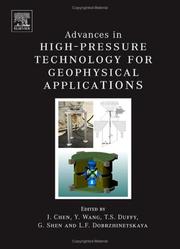| Listing 1 - 3 of 3 |
Sort by
|

ISBN: 0080457665 9780080457666 1280638427 9781280638428 9786610638420 661063842X 9780444519795 0444519793 Year: 2005 Publisher: Boston Elsevier
Abstract | Keywords | Export | Availability | Bookmark
 Loading...
Loading...Choose an application
- Reference Manager
- EndNote
- RefWorks (Direct export to RefWorks)
High-pressure mineral physics is a field that is strongly driven by the development of new technology. Fifty years ago, when experimentally achievable pressures were limited to just 25 GPa, little was know about the mineralogy of the Earth's lower mantle. Silicate perovskite, the likely dominant mineral of the deep Earth, was identified only when the high-pressure techniques broke the pressure barrier of 25 GPa in 1970's. However, as the maximum achievable pressure reached beyond one Megabar (100 GPa) and even to the pressure of Earth's core on minute samples, new discoveries increasingly were
Mineralogy. --- Mineralogical chemistry. --- Geophysics. --- Materials at high pressures.
Book
ISBN: 0128014423 0128013001 9780128014424 9780128013007 Year: 2017 Publisher: Amsterdam, Netherlands ; Oxford, England ; Cambridge, Massachusetts : Elsevier,
Abstract | Keywords | Export | Availability | Bookmark
 Loading...
Loading...Choose an application
- Reference Manager
- EndNote
- RefWorks (Direct export to RefWorks)
Materials --- Extreme environments. --- Materials at high pressures. --- Testing. --- High pressure (Technology) --- Strength of materials --- Environments, Extreme --- Ecology

ISBN: 1280638427 9786610638420 0080457665 0444519793 9780080457666 9780444519795 9781280638428 661063842X Year: 2005 Publisher: Amsterdam ; Boston : Elsevier,
Abstract | Keywords | Export | Availability | Bookmark
 Loading...
Loading...Choose an application
- Reference Manager
- EndNote
- RefWorks (Direct export to RefWorks)
High-pressure mineral physics is a field that is strongly driven by the development of new technology. Fifty years ago, when experimentally achievable pressures were limited to just 25 GPa, little was know about the mineralogy of the Earth's lower mantle. Silicate perovskite, the likely dominant mineral of the deep Earth, was identified only when the high-pressure techniques broke the pressure barrier of 25 GPa in 1970's. However, as the maximum achievable pressure reached beyond one Megabar (100 GPa) and even to the pressure of Earth's core on minute samples, new discoveries increasingly were
Mineralogy. --- Mineralogical chemistry. --- Geophysics. --- Materials at high pressures. --- Geological physics --- Terrestrial physics --- Chemistry, Mineralogical --- Mineral chemistry --- High pressure (Technology) --- Strength of materials --- Earth sciences --- Physics --- Geochemistry --- Physical geology --- Crystallography --- Minerals
| Listing 1 - 3 of 3 |
Sort by
|

 Search
Search Feedback
Feedback About UniCat
About UniCat  Help
Help News
News